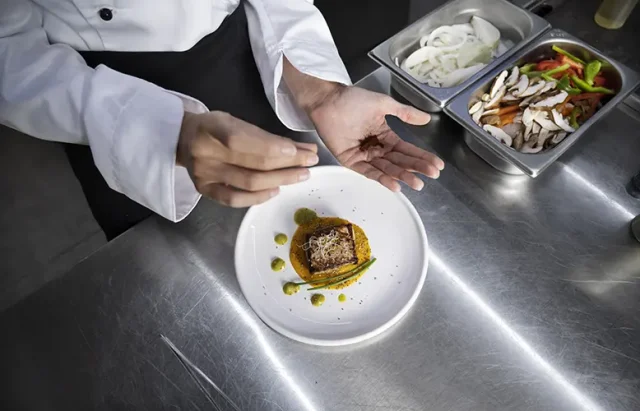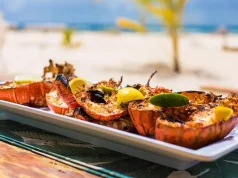
The city of Washington DC has a rich culture and a lot of political history, but also a fascinating gastronomy, which is in the midst of a revolution due to the innovation of molecular gastronomy. Molecular cuisine is expanding and transforming how we experience food, taking modern restaurants to new levels of creativity and sophistication.
In this article, we’ll tell you about this new phenomenon changing the city’s culinary scene and offering a new approach for those interested in taking a food tour around D.C. However, first things first. Let us explain what molecular gastronomy is.
Molecular gastronomy
Molecular gastronomy is the application of science (such as chemistry and physics) in the elaboration of food. It is a fusion between culinary art and science to invent the best dish. Through the application of techniques and tools offered by science, traditional ingredients can be transformed into some innovative and surprising texture or shape, allowing chefs to create challenging and unconventional dishes. That will enable diners to enjoy a truly unique meal, where not only their taste buds are delighted. It is a gastronomy that offers an entirely different and new experience where all the senses are stimulated.
The role of science in cooking
Molecular gastronomy is a showcase of advanced techniques and highlights the importance of science in the kitchen. Chefs delve into chemistry and physics to understand how different components interact to create flavor combinations and textures that awaken all the senses.
Thanks to this scientific approach, intriguing dishes such as hot ice cream and olive oil spherifications can be created. Fusing common ingredients with unconventional methods has allowed chefs to reinvent classic dishes and surprise the most demanding palates.
Pioneering restaurants in Washington, DC
Today, several restaurants in the capital of the United States have embraced molecular gastronomy, bringing innovation to the table. One of the pioneers in this trend is “Minibar by José Andrés,” an establishment that has gained recognition for its experimental approach to cuisine. It is a restaurant where every dish is a culinary masterpiece that defies expectations; you can try everything from spherifications to foams. An out-of-this-world experience that you can’t miss.
Another place we must highlight, which you cannot miss if you are on a food tour in D.C., is “The Bazaar.” You can have unique sensory experiences in this restaurant, thanks to the dishes prepared by the head chef, who combines his passion for science and gastronomy. Nitro-gelification and vacuum flavoring are just some of the techniques applied in this establishment’s dishes to create the most avant-garde recipes.
Impact on the dining experience
The introduction of molecular gastronomy has changed not only the way food is prepared but also the way it is experienced. This technique lets diners enjoy a delicious meal and are immersed in a multi-sensory experience that stimulates sight, smell, touch, and taste.
Thus, restaurants embracing molecular gastronomy attract diners looking for more than just a meal. In these places, the interaction between science and cuisine creates an exciting and participatory environment where dishes are presented as true edible works of art.
Challenging tradition in D.C.’s dining scene
Despite the growing popularity of molecular gastronomy, some critics argue that this trend challenges entrenched culinary traditions. D.C. is a city where history and culture are intertwined and essential to its people, so accepting such avant-garde culinary methods can be challenging for many.
However, proponents of molecular gastronomy argue that this is a natural evolution in the culinary industry. By merging science with tradition, they posit that they are creating a new form of gastronomic expression that respects the past while looking to the future.
The sustainable commitment to molecular gastronomy
Along with the growing roots of molecular gastronomy in Washington, there is also a growing awareness of sustainability. Chefs find themselves experimenting with new techniques and preparations and are increasingly committed to using local and seasonal ingredients. This approach aims to innovate with the region’s authentic flavors and advocates for more responsible culinary practices. Many restaurants incorporating molecular gastronomy have implemented organic waste composting and using renewable energies to reduce their carbon footprint. It is a beautiful fusion of culinary innovation and environmental responsibility.
The impact on the national gastronomic scene
The molecular gastronomy revolution in Washington, DC, is not only transforming the local scene but also having an impact nationally. Restaurants across the country are closely watching the trends emerging in the capital, and some chefs are gradually adopting molecular gastronomy techniques in their kitchens. This diffusion transcends the city borders, contributing to the diversification of gastronomic offerings in the United States and leading the country to new culinary discoveries and experiences.
In other words, the influence of molecular gastronomy in Washington, DC, is marking a milestone in the evolution of American cuisine, consolidating the city as a beacon of gastronomic creativity for the entire country.
The future of gastronomy in Washington DC
The culinary scene in Washington, DC, is constantly evolving, and the introduction of molecular gastronomy has been a critical element in this transformation. As more restaurants embrace these innovative techniques, the U.S. capital is establishing itself as a cutting-edge culinary destination.
Molecular gastronomy has redefined how we understand and experience food, and Washington, DC, has become an epicenter of this culinary revolution. In every dish, diners can savor the unique fusion of science and gastronomy, creating a culinary experience that goes beyond the conventional.
So, have you already embarked on such culinary experiences as we described? If you haven’t, we highly recommend it; you will see that it will change the way you see and taste food.





